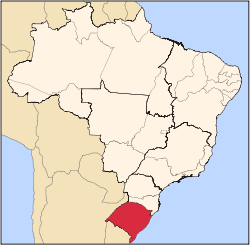Dilermando de Aguiar | |
|---|---|
 Location within Rio Grande do Sul | |
| Coordinates: 29°42′21″S54°12′28″W / 29.70583°S 54.20778°W | |
| Country | |
| State | Rio Grande do Sul |
| Population (2022 [1] ) | |
• Total | 2,806 |
| Time zone | UTC−3 (BRT) |
Dilermando de Aguiar is a municipality in the state of Rio Grande do Sul, Brazil.




